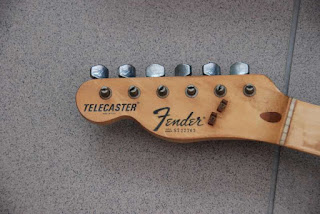What determines the value of a new guitar?
When you walk into a music store looking for a guitar, you find guitars ranging from around 100EUR to several thousands of EUR. They all have 6 strings - most of them anyways - a neck, a body, ...
Let look into where the difference in price comes from.
First of all, guitars are made of wood (most anyways). In the old days, figuring wood was a craft reserved for a carpenter and was very labour intensive. Nowadays, even with CNC machines, only the raw bodies, necks and fretboards can be shaped but the finishing is still something to be done by hand. This means that the finishing is still labour intensive.
Obviously, since labour is a cost, depending where a guitar is made, the price of the woodwork will differ.
On the other hand, if the price of labour is higher, the quality control conducted is more strict as well. If you have an American company and you have to pay 250$ on an American carpenter, you expect more than a Chinese carpenter that does the equivalent for 25$ or less. That is also the reason why the quality of an American made guitar is very consistent compared to a Chinese built where you need to depend on 'luck' to have a good one.
The woodwork isn't all about cosmetics and finish. The most critical part of the woodwork which actually matters for playing is the neck and the fretboard. If the neck and fretboard aren't made correctly, you can have a beautiful guitar to hang against the wall, but playing it...
Next to taste, color, shape, finish, ... what is also an important parameter is the name. Fender, Gibson, PRS, ESP, ... There is a reason why we all know those names. They have proven to deliver good guitars with good consistent quality and have invested in marketing. All those things also make that the resell value is much higher and in the long run, they are likely not to be a too bad an investment.
Electronics. Those will for 95% determine the sound. Although often produced in Asia, the designer determines the specs and the way they sound. It's more than the type of magnets and the number of windings of the coil. Maybe I'll write some more information about them in another post one of these days...
The other hardware will contribute to the quality. Good tuners will keep the guitar tuned. Frets need to be leveled to avoid 'fretbuzz'.
Taking everything I stated above into account, is comes down to this: You get what you pay for. However, if you are a but handy, you should be able to significantly improve the sound of a cheaper guitar. Biggest downside is that hose effort rarely contribute to an additional value when reselling it later on.
To give an idea on how much effort it takes to make a quality guitar, take the tour of the PRS factory.
Let look into where the difference in price comes from.
First of all, guitars are made of wood (most anyways). In the old days, figuring wood was a craft reserved for a carpenter and was very labour intensive. Nowadays, even with CNC machines, only the raw bodies, necks and fretboards can be shaped but the finishing is still something to be done by hand. This means that the finishing is still labour intensive.
Obviously, since labour is a cost, depending where a guitar is made, the price of the woodwork will differ.
On the other hand, if the price of labour is higher, the quality control conducted is more strict as well. If you have an American company and you have to pay 250$ on an American carpenter, you expect more than a Chinese carpenter that does the equivalent for 25$ or less. That is also the reason why the quality of an American made guitar is very consistent compared to a Chinese built where you need to depend on 'luck' to have a good one.
The woodwork isn't all about cosmetics and finish. The most critical part of the woodwork which actually matters for playing is the neck and the fretboard. If the neck and fretboard aren't made correctly, you can have a beautiful guitar to hang against the wall, but playing it...
Next to taste, color, shape, finish, ... what is also an important parameter is the name. Fender, Gibson, PRS, ESP, ... There is a reason why we all know those names. They have proven to deliver good guitars with good consistent quality and have invested in marketing. All those things also make that the resell value is much higher and in the long run, they are likely not to be a too bad an investment.
Electronics. Those will for 95% determine the sound. Although often produced in Asia, the designer determines the specs and the way they sound. It's more than the type of magnets and the number of windings of the coil. Maybe I'll write some more information about them in another post one of these days...
The other hardware will contribute to the quality. Good tuners will keep the guitar tuned. Frets need to be leveled to avoid 'fretbuzz'.
Taking everything I stated above into account, is comes down to this: You get what you pay for. However, if you are a but handy, you should be able to significantly improve the sound of a cheaper guitar. Biggest downside is that hose effort rarely contribute to an additional value when reselling it later on.
To give an idea on how much effort it takes to make a quality guitar, take the tour of the PRS factory.





Reacties
Een reactie posten